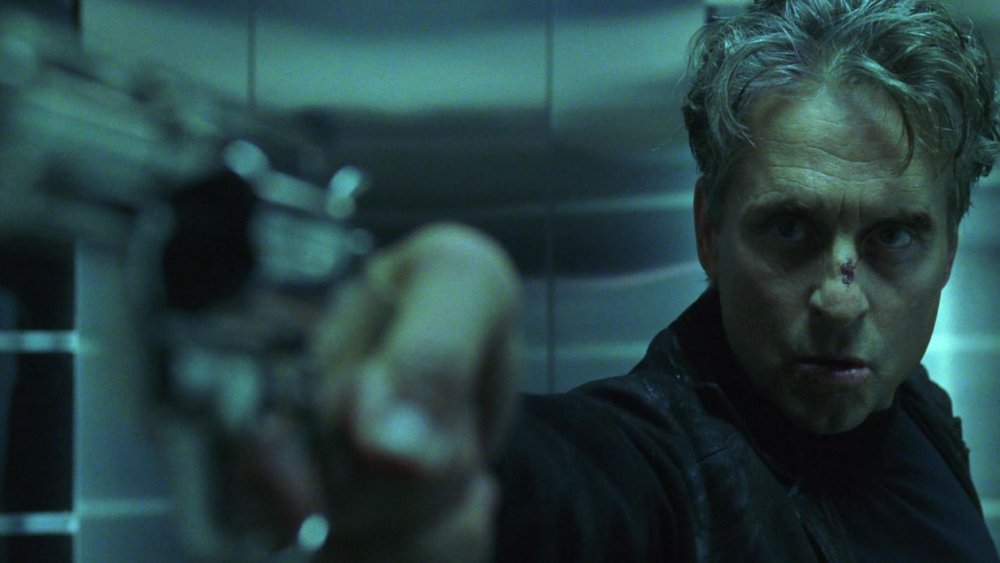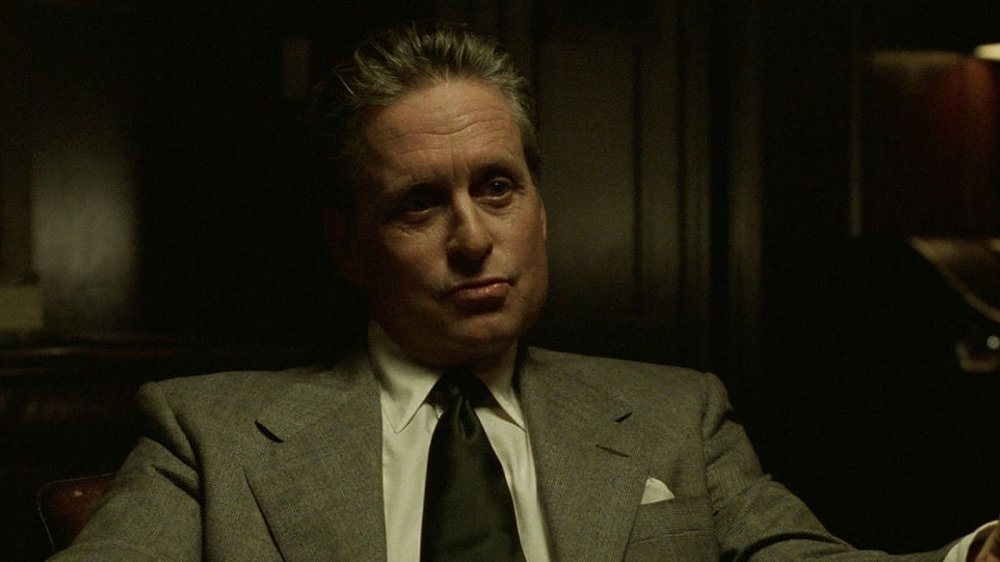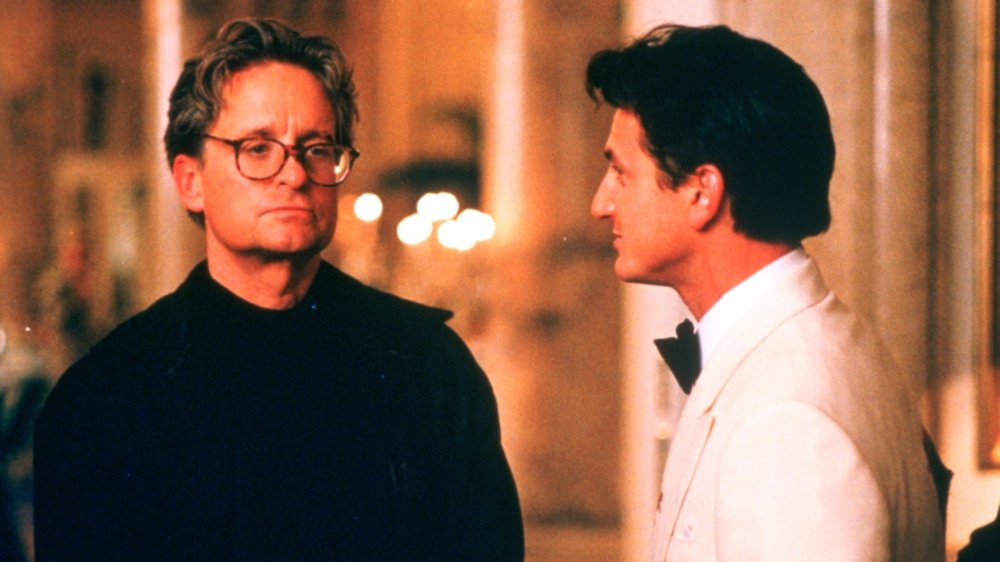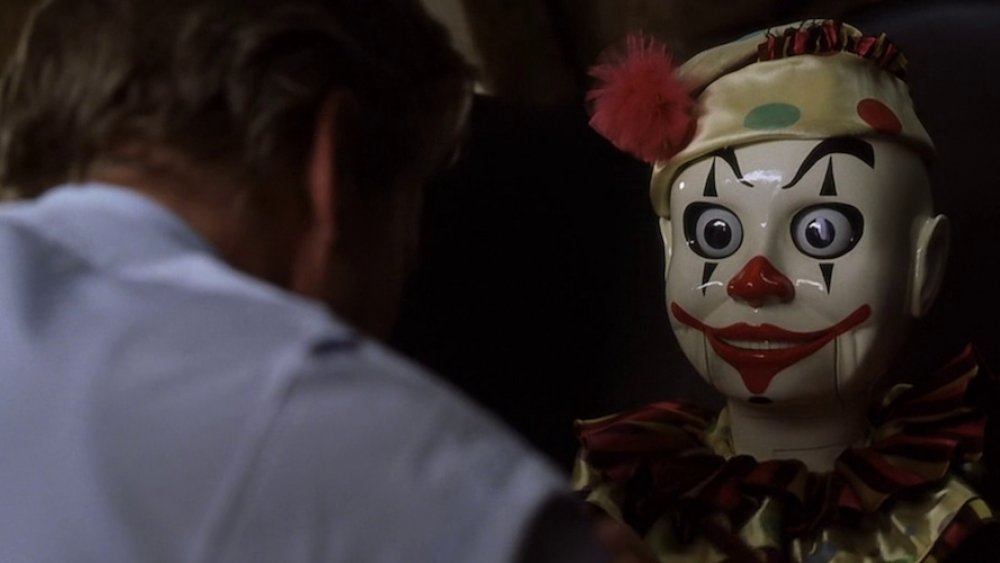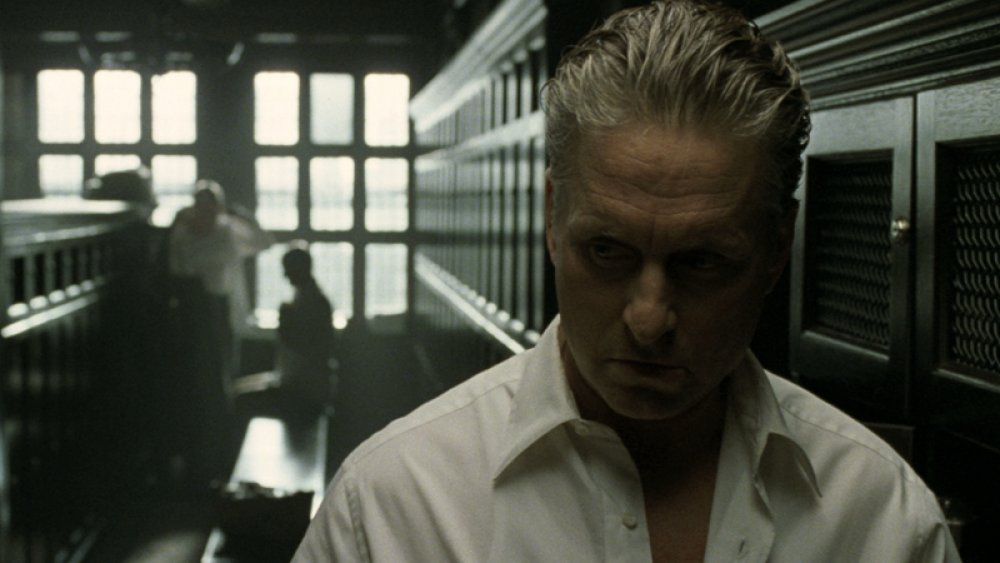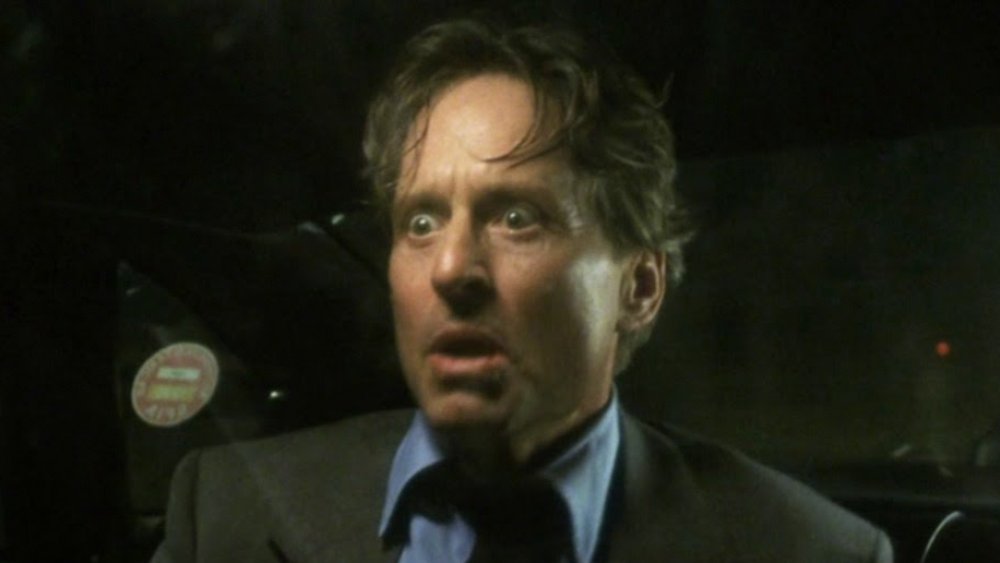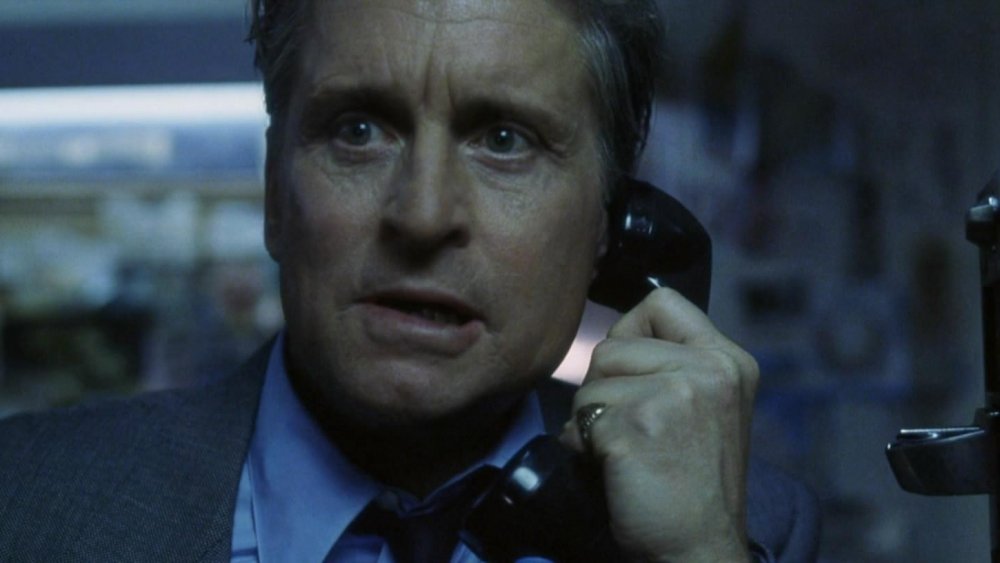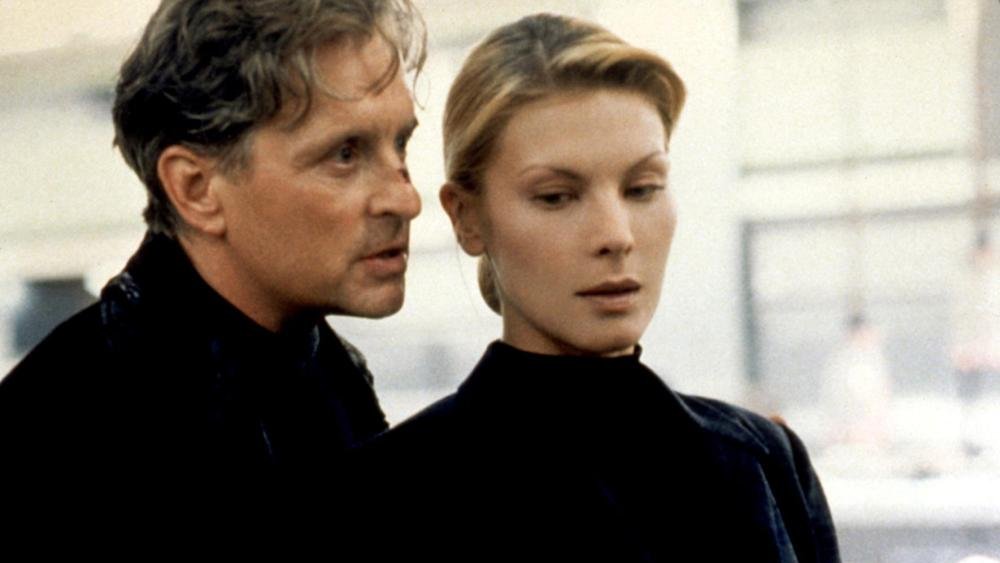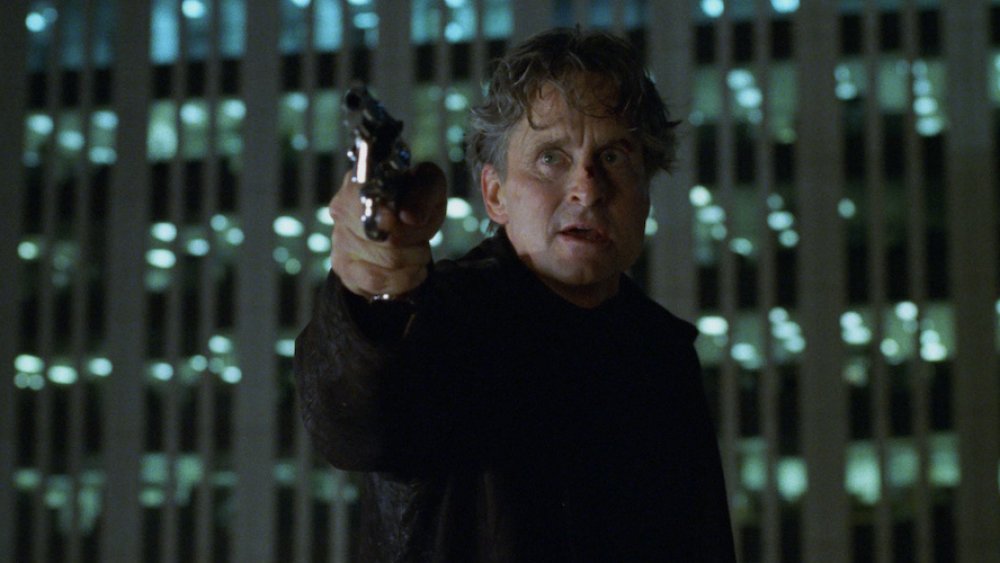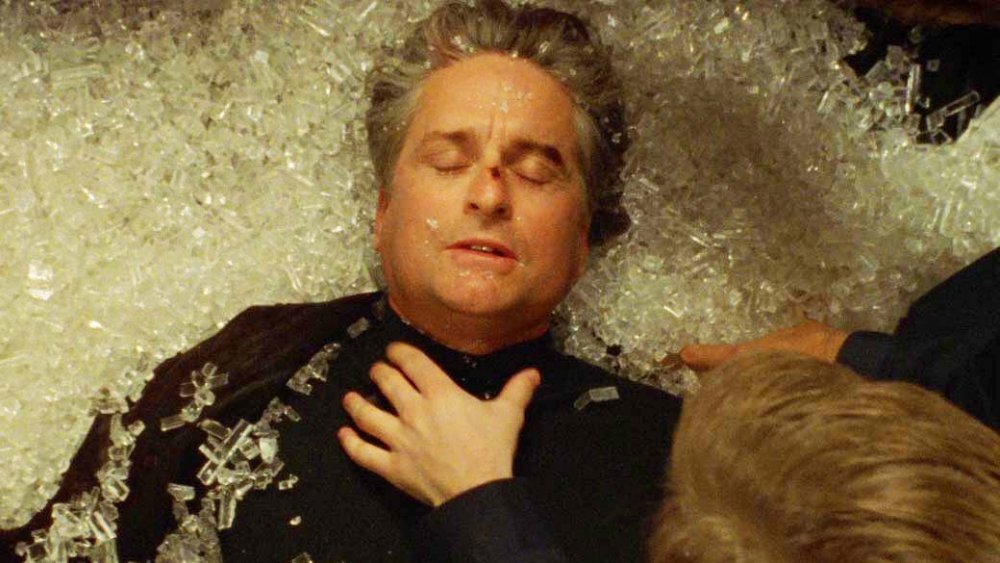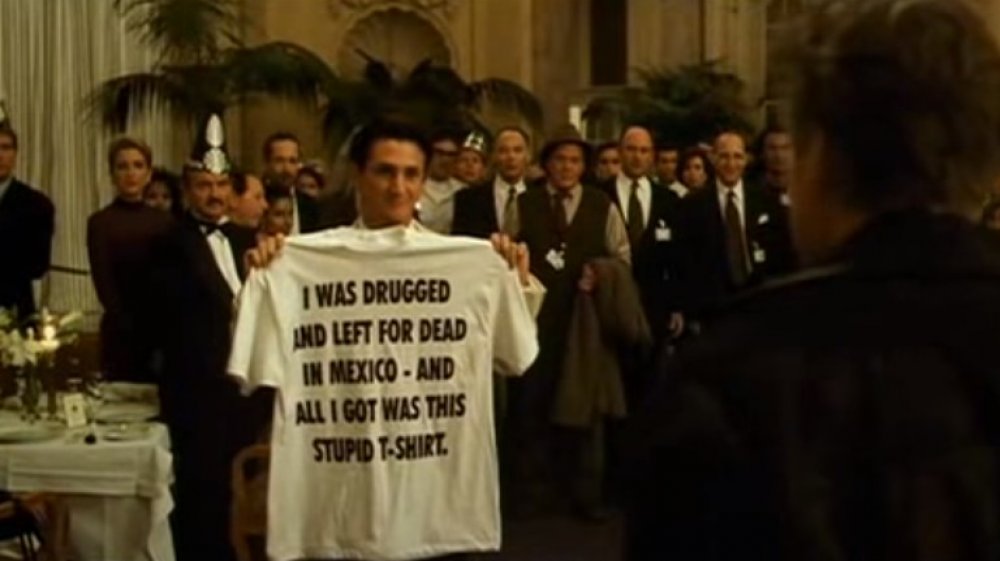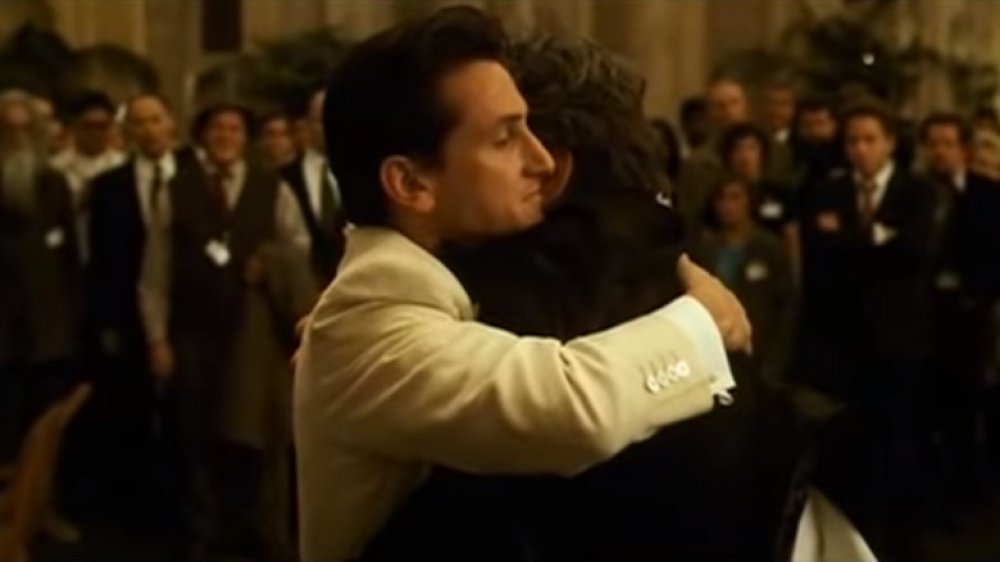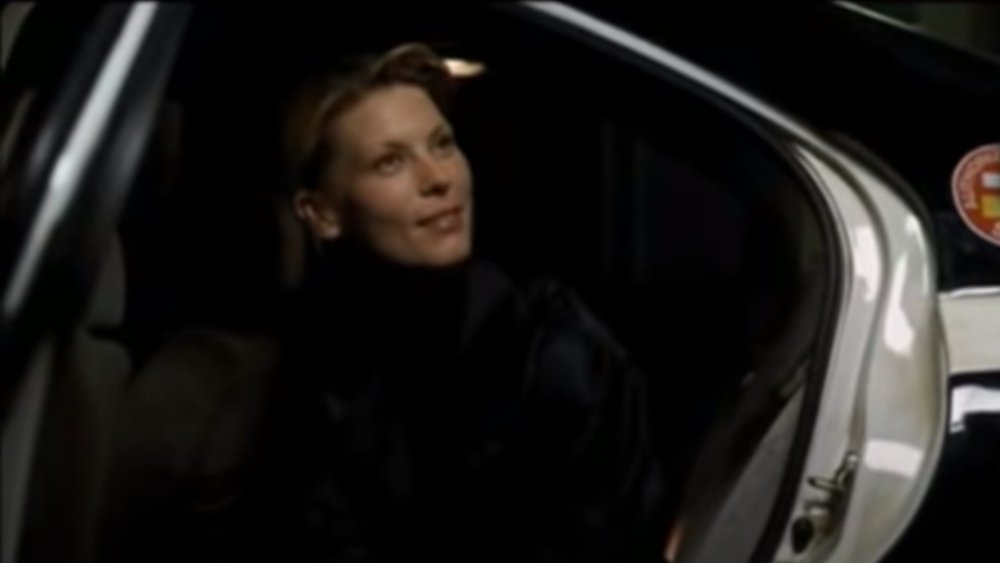The Ending Of The Game Explained
Directed by David Fincher, The Game was a minor financial success when it dropped in 1997, but its creeping sense of dread and paranoia impressed the likes of film critic Roger Ebert, who gave the movie a glowing review. Today, it stands with a 74% on Rotten Tomatoes, although it's been largely overshadowed by Fincher's other films, like Fight Club, Zodiac, and The Social Network. Nevertheless, The Game is a solid mystery thriller, combining a superb cast (including Michael Douglas, Deborah Kara Unger, and Sean Penn) with a truly unique and unsettling plot.
However, The Game is also one of the twistiest movies of all time, dealing with assassins, conspiracies, and elaborate blackmail schemes. And the whole time, the film makes you question what's real, what's not, what's safe, and what's dangerous. So at the end of it all, it's understandable if it leaves you scratching your head wondering what exactly happened. If you're still not sure what exactly went down, don't worry — we've got you covered. We took a deep dive into David Fincher's labyrinthine thriller, and we're here to explain the ending of The Game.
It goes without saying, but be warned, there are spoilers ahead.
At the beginning of The Game, Nicholas is a very lonely man
First, let's get our bearings. The main character of The Game is Nicholas Van Orton (Michael Douglas), who's a wealthy but rather sad banker. As Fincher himself once pointed out, Nicholas is sort of like a "good-looking Scrooge." The man lives alone in his massive mansion, and he's estranged from the only people who ever really knew him — his ex-wife and brother. To give an idea of what he's like, in one scene, Nicholas receives a call at work, and his secretary says, "I have an Elizabeth on line three." A few moments later, another employee clarifies, "Your wife, sir," as though Nicholas had trouble remembering. He coldly replies, "I know who it is."
He has no meaningful relationships at work, but even outside of his career, his life is lonely and empty. On his 48th birthday, Nicholas spends his evening eating a reheated burger and watching television. This birthday is particularly unsettling because his father committed suicide upon turning the same age, and he even did the deed in the very mansion where Nicholas now lives. The film paints a picture that Nicholas is living an unfulfilling existence, haunted by his dad's suicide, with nothing to look forward to but death. But all of that changes when he receives an unusual birthday gift.
The weirdest birthday gift of all time
Even though he spends his days and nights alone, Nicholas does have family, most notably his brother Conrad (Sean Penn). Granted, the two couldn't be more different — Nicholas is cold while Conrad is outgoing — and the two don't really talk all that much. Still, Conrad visits Nicholas on his birthday and gives him a curious gift — a voucher for something called "the game." Conrad insists that it will change Nicholas' life for the better, almost as though Conrad himself has played the game before. At first, Nicholas is reluctant, but he eventually agrees to participate.
To sign up for the game, Nicholas must visit the headquarters of a creepy company called Consumer Recreation Services, where he has to undergo a series of bizarre tests. During the strange, elaborate process, the rules of the game are never quite explained, and he's required to answer a string of personal, psychological questions. Naturally, Nicholas is frustrated with the length of these tedious tests and the lack of explanation as to what's happening, and he grows even angrier when he learns that his application has been rejected. Furious, Nicholas returns to life as normal... or so he believes.
Nicholas' game begins
Even though Consumer Recreation Services claimed Nicholas's application was rejected, we soon learn that the company is proceeding with their plans anyway. And boy do they start the game off in a creepy, daunting way. After a hard day of work, Nicholas returns home, but as he pulls into his driveway he sees what looks like a dead body in front of his mansion.
It turns out to be a clown doll dressed in fancy clothes, but there's a deeper meaning here: Nicholas' father committed suicide by jumping to his death from the mansion's roof and the clown doll is positioned similarly. Not only does this indicate Consumer Recreation Services is a twisted group of people, but it also means they know quite a lot about Nicholas's personal life. Maybe a little too much.
Nicholas brings the doll in, sits it on his living room chair, and watches the news as we get to one of the most memorable scenes from the movie. While Nicholas investigates the doll for clues, the reporter on the television starts talking to Nicholas, as though it's a video call (which, remember, would have ben pretty novel in 1997). Naturally, Nicholas is absolutely spooked. How is the news anchor using his television that way? How are they seeing Nicholas's every move? He discovers that the clown doll contains a miniature camera. Nicholas — and the viewers — begin to understand that Consumer Recreation Services is a powerful, even seemingly omniscient, organization.
The game completely invades Nicholas' life
Nicholas is still in the dark about the rules — or even the goal — of the game, but one thing is sure: everything starts going horribly wrong for him. The pen in his pocket leaks ink over his shirt, his suitcase won't open during an important meeting, and a waitress spills a tray on him. There's a constant feeling that Consumer Recreation Services is somehow behind it all, and Nicholas starts becoming paranoid. The man in the stall asking for toilet paper — is that a stranger in need of help, or an employee of CRS?
Viewers go back and forth on what's real and what's orchestrated by Consumer Recreation Services, and so does Nicholas. For example, he receives a note that's clearly part of the game instructing him to follow a waitress named Christine outside a restaurant, but Christine doesn't seem to be in on the game. A man starts dying in the middle of the street, but before Nicholas calls for an ambulance, he asks, "How do we know he's for real?" He ends up riding to the hospital to fill out papers. Nicholas insists that he sees through all of the staged events and acting, saying things like "Are the sirens really necessary?" But at the same time, it all seems so real.
The game appears to be a scam
After his adventure with Christine, Nicholas continues to be jerked around in different directions. Consumer Recreation Services apparently doesn't respect any boundaries, as the company breaks into and vandalizes Nicholas' home. But as the movie progresses, Nicholas starts believing that the game isn't really a game after all and that he may be in danger...
A very distraught Conrad visits Nicholas, claiming he's under attack from Consumer Recreation Services. Conrad says he keeps paying the company, but they continue to terrorize him, driving him to the brink of insanity. Conrad apologizes to Nicholas for suggesting playing the game, believing that both of them are now victims of an elaborate scheme — like, a conspiracy theory-level scheme.
It appears that Consumer Recreation Services poses as a company that offers complex services to the wealthy, but we are now led to believe that this is a cover — the company's true intention is to rob its clients. As Nicholas reflects on all his escapades, he starts realizing that he's actually given a lot of sensitive information to CRS, including his signature, credit card, and even insights on how to access his bank accounts. Not long after this scary encounter with Conrad, Nicholas is locked inside a taxi cab, driven into a body of water, and almost drowns to death.
The question now is, is the game still an experiential service or is it a scam to steal money?
Nicholas seemingly loses everything
After his near-death experience, Nicholas decides the game is a serious threat to his finances, reputation, and life. He calls the police to investigate Consumer Recreation Services, but the company headquarters he once visited is now empty. Believing he must take matters into his own hands, he tracks down Christine, the waitress he met earlier. Nicholas believes she may be the key to getting the company to back off and to return his life to normalcy. He discovers that Christine is, in fact, an employee of Consumer Recreation Services.
At first, she seems sympathetic to Nicholas, explaining how the game works — that it's truly a scam to get his money. Those psychological tests he did earlier? They were to extract information from him to guess his passwords for his bank accounts. Nicholas panics, calls his bank, and gives the security code to see if his finances are still intact. It's then that Christine drugs Nicholas, revealing that she was waiting until they finally had the code.
Nicholas wakes up in Mexico with his bank accounts drained, his house foreclosed, and no one to believe his crazy ravings about a shadow organization called Consumer Recreation Services.
Nicholas hunts down the people responsible
After Nicholas regains consciousness in Mexico, he resolves to fix this himself and get revenge. After selling his watch, he returns to the United States, only to find that Conrad has been institutionalized. Nicholas manages to retrieve his gun before it's taken from his mansion and in desperation, he seeks help from his ex-wife, apologizing for his past behavior in the process.
But he no longer needs her help when he notices a critical detail on the television behind her. Nicholas recognizes the man in the commercial — it was the same guy who originally performed psychological tests on Nicholas at Consumer Recreation Services. Nicholas locates the actor, interrogates him, and forces him to lead Nicholas to the company's new location. The actor obliges, probably because Nicholas is unhinged and wielding a gun.
Eventually, Nicholas enters the company building, which is filled with actors that's he's seen in the past few days. He spots Christine, who seems very surprised to see him. Nicholas, who is fed up and scared, takes Christine hostage, and retreats to the roof while employees chase them and try to break down the locked door. Christine becomes especially concerned when she realizes Nicholas's gun isn't a prop...
Nicholas seemingly shoots Conrad and jumps off a building
Consumer Recreation Service employees are about to break through the door as Nicholas points his gun at Christine. She tries desperately to explain that Nicholas' finances are safe and that his friends and family are behind the door, ready to celebrate his victory. Christine insists that everything Nicholas saw was an illusion and all the events were carefully orchestrated — including Christine drugging Nicholas and leaving him in Mexico.
Nicholas doesn't buy her story, and who can blame him? Christine's not exactly trustworthy and Consumer Recreation Service is a very deceitful organization, capable of creating extremely believable scenarios. The employees finally bust through the door and Nicholas shoots the first person through — who turns out to be Conrad. Christine was telling the truth: On the other side of the door, Nicholas' family and friends were waiting to congratulate him.
The crowd goes silent and Conrad is pronounced dead at the scene. In response, Nicholas jumps off the building in a suicide attempt. During his free fall, he recounts sweet memories of his now-dead brother... but lo and behold, Nicholas lands on a giant cushion.
Nicholas was never in any danger
After surviving his fall, Nicholas is congratulated by Consumer Recreation Services employees as well as Conrad, who is alive after all. Consumer Recreation Services never intended to hurt or steal from Nicholas. They only made it seem like he was in danger. Everything was carefully planned — the threat of blackmail, the employees pursuing Nicholas and Christine, and Nicholas getting drugged and left in Mexico. Behind the scenes, CRS' employees were rooting for Nicholas to persevere.
Consumer Recreation Services fully restores Nicholas' bank balances and moves all of his belongings back into his house. However, Nicholas does end up helping pay for the game, since it's a legitimate company offering a real service. Conrad offers to pay for all of it, but Nicholas wants to split the bill. (The amount isn't shown, but judging by Nicholas' expression, it's probably pretty expensive.) In the end, it's revealed that Conrad asked Consumer Recreation Services to conduct a game for Nicholas to help him improve as a person.
Conrad and Christine were in on it the whole time
Remember earlier when Conrad apologized for getting Nicholas involved, claimed he was under attack from Consumer Recreation Services, and was institutionalized? All of that was an act. Conrad was in on it the entire time — not only does Consumer Recreation Services use employees to conduct games, but they also involve the people closest to their targets. Conrad was trained and told the plan from the get-go, and everything he did was part of the game.
The story is the same with Christine. Christine really is an employee of Consumer Recreation Services, but she never had any malicious intent toward Nicholas. Christine didn't actually steal his confirmation code to gain access to his finances. She only pretended to betray him, and after all is said and done, she was only making it look like she was his enemy.
Yes, even Nicholas shooting Conrad and jumping off a building was all part of the plan. Everyone, including Nicholas and Christine, knew that Nicholas was going to "shoot" Conrad and jump off the building. Conrad anticipated this and faked getting shot. And the employees of Consumer Recreation Services were ready to catch Nicholas when he jumped off the building.
The purpose of the game was to teach Nicholas a lesson
The reason Conrad asked Consumer Recreation Services to orchestrate a game for Nicholas was to help him. As we saw at the beginning of the film, Nicholas was a sad, lonely, and bitter man. He treated people terribly and even sabotaged the most important (and only) relationships in his life. To transform Nicholas, something crazy had to happen to him, and that's why Conrad used the game. Was it a bit extreme and unbelievable? Yes. But did it work? Yes. In the end, Nicholas has started treating people better and fixing his relationships.
The Game is an interesting theory turned into a movie. The theory is that people's personalities change when something incredibly intense and spectacular happens to them. Maybe if the event is just right and just radical enough, it'll change the person for the better. Can we artificially create those events for others? The answer in The Game is yes. We're not sure how ethical, logical, or doable it is in real life, but it's certainly an interesting concept. In the case of Nicholas Van Orton, it worked out perfectly.
Nicholas actually has feelings for Christine/Claire
After Nicholas learns the truth about the game, he discovers that Christine's real name is Claire. At this point, Nicholas is a new man, although his old fortunes and relationships are restored. So he decides to live life a little more and asks Claire out to dinner. It turns out that Claire has another "game" to carry out, this time in Australia, so unfortunately she can't do dinner. However, she asks Nicholas to join her for coffee in the morning at the airport before her plane leaves. The movie ends before we hear his response.
Despite everything Claire did to Nicholas during the game — drugging him, lying to him, and pretending he shot his brother — Nicholas still develops feelings for Claire. There's a lot of smoke and mirrors in The Game: Conrad fakes being attacked and committed, Claire fakes double-crossing Nicholas, and the employees of the game even fake Conrad's death. But real feelings came from it, and this closing scene hints at how they could help open a new chapter in Nicholas' life.
